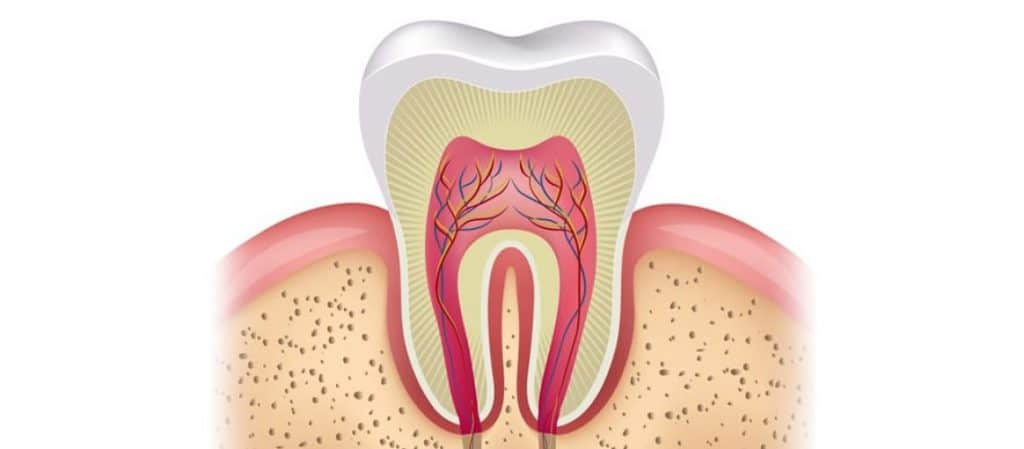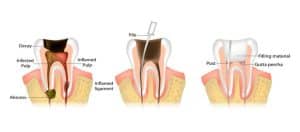Common Myths About Root Canals: Separating Fact from Fiction
Root canals often carry a negative reputation, surrounded by myths and misconceptions that contribute to dental anxiety. If you have concerns about root canals or require dental care, consult with your dentist for personalised advice tailored to your oral health needs.
Root canals still maintain their reputation as long, painful, and generally terrifying dental procedures. Dental advancements have ensured that this is no longer the case, but the myths related to root canals still endure. In this blog, we demonstrate a few myths that are still circulating and point out how they no longer apply.
Myth 1: Root Canals Are Painful
- Fact: Advances in dental technology and anesthesia make root canals relatively painless. The procedure is performed under local anesthesia, ensuring comfort during the process.
Myth 2: Root Canals Cause Illness
- Fact: There is no scientific evidence linking root canals to systemic illnesses. Root canals are a safe and effective way to treat infected teeth without compromising overall health.
Myth 3: Tooth Extraction Is a Better Alternative
- Fact: Saving a natural tooth through a root canal is preferred over extraction. Preserving the natural tooth structure maintains functionality and prevents potential oral health issues.
Myth 4: Root Canals Require Multiple Appointments
- Fact: Many root canals can be completed in one or two appointments. Advances in technology and efficient procedures have streamlined the root canal process.
Myth 5: Root Canals Remove Sensation from the Tooth
- Fact: While the nerve tissue is removed during a root canal, the tooth’s sensation is preserved. The tooth remains functional and responsive to pressure and temperature.
Myth 6: Root Canals Only Treat Pain
- Fact: Root canals address various dental issues, not just pain. They are performed to treat infections, abscesses, and prevent further complications.
Myth 7: Root Canals Cause Serious Health Problems
- Fact: Root canals are a standard dental procedure with a high success rate. They do not cause health problems; instead, they alleviate existing dental issues and promote oral health.
Myth 8: You Only Need a Root Canal if You Have Severe Pain
- Fact: Pain is a common symptom, but not the only indicator for a root canal. Other signs include sensitivity to hot or cold, swelling, and tenderness. Early intervention is key to successful treatment.
Myth 9: Root Canals Lead to Tooth Loss Eventually
- Fact: Root canals aim to save natural teeth, not contribute to tooth loss. With proper care, a tooth treated with a root canal can last a lifetime.
Myth 10: Root Canals Are Only for Older Adults
- Fact: Root canals can be performed at any age. Dental issues, such as infections or trauma, can affect individuals of all ages, necessitating root canal treatment.
Frequently Asked Questions (FAQs) about Root Canal Myths:
Are root canals really as painful as people say?
No, modern root canal procedures are performed under local anesthesia, ensuring minimal discomfort during the process.
Can a root canal cause health issues?
No, there is no scientific evidence linking root canals to systemic health problems. They are a safe and common dental procedure.
Is tooth extraction a better option than a root canal?
Preserving a natural tooth through a root canal is preferable to extraction. It maintains tooth structure and prevents potential oral health issues.
How long does a root canal procedure take?
Many root canals can be completed in one or two appointments, with advances in technology streamlining the process.
Does a root canal remove all sensation from the tooth?
While the nerve tissue is removed, the tooth’s sensation is preserved, and it remains functional and responsive.
Can root canals cause serious health problems?
No, root canals are a standard dental procedure with a high success rate. They do not cause serious health problems.
Is severe pain the only reason for a root canal?
While pain is a common symptom, other signs such as sensitivity to hot or cold, swelling, and tenderness may indicate the need for a root canal.
Do root canals lead to tooth loss eventually?
No, the goal of a root canal is to save natural teeth. With proper care, a tooth treated with a root canal can last a lifetime.
Are root canals only for older adults?
Root canals can be performed at any age. Dental issues requiring root canal treatment can affect individuals of all ages.
Are there alternatives to root canals?
Alternatives to root canals include tooth extraction or no treatment, but these may have negative consequences for oral health.
Do root canals weaken the tooth?
A tooth treated with a root canal is not inherently weakened. However, a crown may be recommended to provide additional strength.
Can I drive home after a root canal?
In most cases, it is safe to drive after a root canal as the local anesthesia used during the procedure typically wears off within a few hours.
Can I eat normally after a root canal?
It is generally advisable to avoid chewing on the treated tooth immediately after a root canal. Your dentist will provide specific post-treatment instructions.
Can I go back to work after a root canal?
Most individuals can resume normal activities, including work, after a root canal. However, some may choose to take the rest of the day off for comfort.
Is it common for root canals to fail?
While rare, root canals may have a small failure rate. Factors such as proper restoration and follow-up care influence success rates.
what is a root canal?
A root canal is a procedure that remedies the decay or trauma that occurs to a tooth’s nerve. Specifically, it is the compromise of pulp (which supplies nutrients to the tooth) through infection that requires a root canal. If a patient were to wait too long to undergo the root canal, advanced infection would inevitably result in the tooth being extracted altogether.
If this is the case, shouldn’t my tooth be hurting?
Although tooth pain might be a factor, it is not always present when someone requires a root canal. An infection or root level decay might be occurring regardless, and this can be determined fairly easily with tests available to dentists. These tests include percussion testing and application of a pulp vitality machine.
If I do need a root canal, won’t it take months?
Although some may believe that a root canal occurs over half a dozen sessions, this is not the case at all. Instead, the root canal procedure can occur in one or two sessions, making it a procedure that will leaving you feeling better in no time.
In cases where there is an advanced infection or something similarly problematic related to the tooth, several more visits might need to occur. For the most part, regular root canal procedures do not require this many sessions.
Won’t I be screaming with pain in the dentist’s chair?
Significant pain was once something that occurred during root canal procedures, but this is no longer the case. Memories of painful root canals occurred as a result of older, invasive techniques coupled with the use of general anaesthesia.
Significant advancements in dental procedures have ensured that the pain related to a root canal is relative to that of receiving a filling. The pain is more often related to the infection of the tooth itself, which obviously only clears up with a root canal!
Need your own root canal?
If you’ve been putting off your root canal, we encourage you to book your appointment in as soon as possible – it’s nowhere near as scary or painful as you think! Contact the friendly team at Bay Street Dental for more information.
Are root canals really as painful as people say?
No, modern root canal procedures are performed under local anesthesia, ensuring minimal discomfort during the process.
Can a root canal cause health issues?
No, there is no scientific evidence linking root canals to systemic health problems. They are a safe and common dental procedure.
Is tooth extraction a better option than a root canal?
Preserving a natural tooth through a root canal is preferable to extraction. It maintains tooth structure and prevents potential oral health issues.
How long does a root canal procedure take?
Many root canals can be completed in one or two appointments, with advances in technology streamlining the process.
Does a root canal remove all sensation from the tooth?
While the nerve tissue is removed, the tooth’s sensation is preserved, and it remains functional and responsive.
Can root canals cause serious health problems?
No, root canals are a standard dental procedure with a high success rate. They do not cause serious health problems.
Is severe pain the only reason for a root canal?
While pain is a common symptom, other signs such as sensitivity to hot or cold, swelling, and tenderness may indicate the need for a root canal.
Do root canals lead to tooth loss eventually?
No, the goal of a root canal is to save natural teeth. With proper care, a tooth treated with a root canal can last a lifetime.
Are root canals only for older adults?
Root canals can be performed at any age. Dental issues requiring root canal treatment can affect individuals of all ages.
Are there alternatives to root canals?
Alternatives to root canals include tooth extraction or no treatment, but these may have negative consequences for oral health.
Do root canals weaken the tooth?
A tooth treated with a root canal is not inherently weakened. However, a crown may be recommended to provide additional strength.
Can I drive home after a root canal?
In most cases, it is safe to drive after a root canal as the local anesthesia used during the procedure typically wears off within a few hours.
Can I eat normally after a root canal?
It is generally advisable to avoid chewing on the treated tooth immediately after a root canal. Your dentist will provide specific post-treatment instructions.
Can I go back to work after a root canal?
Most individuals can resume normal activities, including work, after a root canal. However, some may choose to take the rest of the day off for comfort.
Is it common for root canals to fail?
While rare, root canals may have a small failure rate. Factors such as proper restoration and follow-up care influence success rates.
what is a root canal?
A root canal is a procedure that remedies the decay or trauma that occurs to a tooth’s nerve. Specifically, it is the compromise of pulp (which supplies nutrients to the tooth) through infection that requires a root canal. If a patient were to wait too long to undergo the root canal, advanced infection would inevitably result in the tooth being extracted altogether.
If this is the case, shouldn’t my tooth be hurting?
Although tooth pain might be a factor, it is not always present when someone requires a root canal. An infection or root level decay might be occurring regardless, and this can be determined fairly easily with tests available to dentists. These tests include percussion testing and application of a pulp vitality machine.
If I do need a root canal, won’t it take months?
Although some may believe that a root canal occurs over half a dozen sessions, this is not the case at all. Instead, the root canal procedure can occur in one or two sessions, making it a procedure that will leaving you feeling better in no time.
In cases where there is an advanced infection or something similarly problematic related to the tooth, several more visits might need to occur. For the most part, regular root canal procedures do not require this many sessions.
Won’t I be screaming with pain in the dentist’s chair?
Significant pain was once something that occurred during root canal procedures, but this is no longer the case. Memories of painful root canals occurred as a result of older, invasive techniques coupled with the use of general anaesthesia.
Significant advancements in dental procedures have ensured that the pain related to a root canal is relative to that of receiving a filling. The pain is more often related to the infection of the tooth itself, which obviously only clears up with a root canal!
Need your own root canal?
If you’ve been putting off your root canal, we encourage you to book your appointment in as soon as possible – it’s nowhere near as scary or painful as you think! Contact the friendly team at Bay Street Dental for more information.











